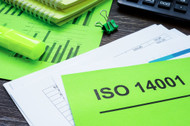Understanding ISO 14001: A Vital Step Towards Environmental Responsibility
21st Feb 2024
In an age where environmental consciousness is paramount, businesses are seeking ways to demonstrate their commitment to sustainable practices. ASC Direct, recently achieved the prestigious ISO 14001 certification, signalling our dedication to the planet. But the certification doesn’t mean much to our customers, without the detail to back it up, so let’s talk about what the ISO 14001 is and why you should care!
How is the ISO 14001 Different to Other Certifications?
It's easy to get lost in all the numbers, but it’s important we distinguish between ISO 14001 and other ISO standards, such as ISO 45001 and ISO 14000. While ISO 45001 primarily focuses on occupational health and safety, ISO 14001 is specifically tailored towards environmental management systems (EMS). It encompasses a holistic approach towards minimising a company's environmental footprint and promoting sustainability.
However both equally utilise the Plan - Do - Check - Act cycle, which is used to continually update the operations of a business regardless of goals.
Separately, ISO 14000 refers to a family of environmental standards, with ISO 14001 being its most recognised member, outlining specific requirements for EMS implementation within organisations.
Why is ISO 14001 essential for businesses?
Beyond regulatory compliance, the certification helps identify environmental risks and empowers leadership to mitigate them effectively. By implementing robust EMS, companies can streamline operations, reduce resource consumption, minimise waste generation, and ultimately lower costs. Moreover, ISO 14001 enhances the company's reputation, increasing trust from stakeholders, including customers, investors, and the wider community.

How to Implement ISO 14001 Practices
Implementing ISO 14001 requires a strategic approach. Businesses must understand the standard's requirements, align them with their core values, and integrate them into their existing practices. Any blatant contradictions between existing systems and new environmental goals will serve as a red flag to any auditor that your organisation is just trying to tick boxes, with no true intent of making an impact.
Developing an effective EMS involves setting clear environmental objectives, implementing controls to reduce ecological impact, and training employees to ensure compliance at all levels. Regular monitoring and periodic reviews are crucial for tracking progress, identifying areas for improvement, and maintaining certification eligibility.
For businesses aspiring to achieve ISO 14001 certification, a structured approach is essential:
- Develop an EMS aligned with ISO 14001 standards, incorporating measurable key performance indicators and setting achievable targets.
- Implement the EMS effectively across all facets of the organisation, ensuring comprehensive training, awareness and intent among employees.
- Engage a reputable third-party auditor to assess the effectiveness of the EMS and provide actionable feedback for improvement.
- Address any non-conformities identified during the audit. Promptly documenting corrective actions taken to regain compliance.
- Present evidence of resolution and improved environmental metrics to the auditor for final certification approval.
- Celebrate your new certification!

How Did ASC Direct Get ISO 14001 Certified?
So how did we meet the ISO 14001s standards? Obviously, we’re continuing to go through the cyclable review process constantly. But there are a few areas we’d like to highlight!
- We’ve committed to sourcing 100% of our energy from sustainable sources, in line with the Environmental Protections Act of 1990 and the Energy Savings Opportunity Scheme (EU Exit Regulations) 2014. Notably, ASC Direct falls comfortably under the threshold for UK undertakings subject to these regulations, employing fewer than 250 people and maintaining an annual turnover below 50 million euros, but we wanted to meet those standards long before we were required to! One way we have quantified our ecological progress is the adoption of LED lighting units as we constantly replace traditional lightbulbs with energy-efficient LED alternatives, as units fail.
- We also ensure responsible water usage by drawing our office water from natural sources. We restrict water consumption in the warehouse to the wash down portion of our water-based printing processes and fire sprinkler usage.
- In the packaging sector, where waste cardboard cut-offs pose a significant environmental challenge, we adhere to the Controlled Waste Regulations 2012. This means we maintain meticulous record-keeping of waste transfers for 2 years minimum, as well as verification of waste management contractors' licenses (with expiry dates), and implementation of waste segregation practices on-site, employing defined waste streams based on EWC codes and ASC SIC codes. These elements of our EMS are a good example of how businesses need to adapt the ISOs requirements to their own industries.
Attaining ISO 14001 certification is not merely a bureaucratic exercise but a sign of a company's commitment to sustainability and responsible business practices. It sets businesses apart as leaders in environmental stewardship and paves the way for a greener, more sustainable future. So, let's celebrate our achievement as we encourage other organisations to improve their sustainability. Maybe you could benefit from an eco-friendly packaging provider?

James Palfrey-Smith is the Commercial Manager at ASC Direct with extensive experience in both operations and sales. James is passionate about solving packaging problems, delivering fast customer support, and building lasting relationships. Outside of work, he enjoys outdoor activities like hiking and skiing. A fan of real ale and business podcasts, he continuously seeks personal and professional growth.
Find James on Linkedin
Find out more about James

